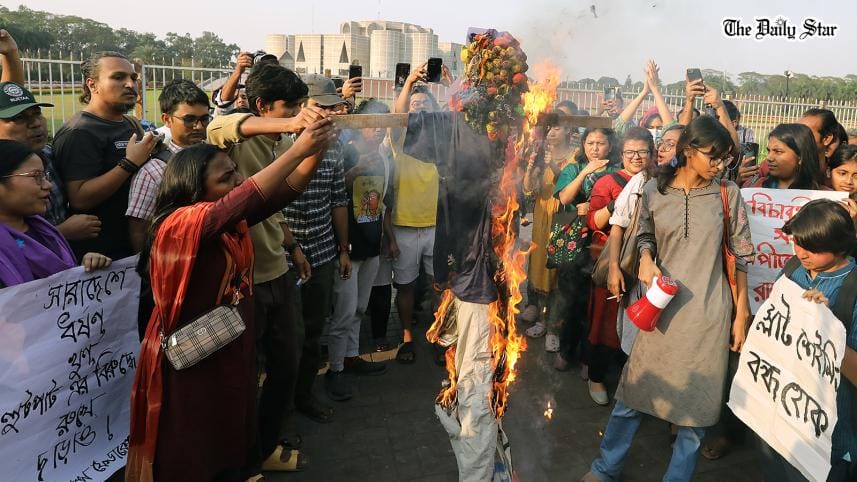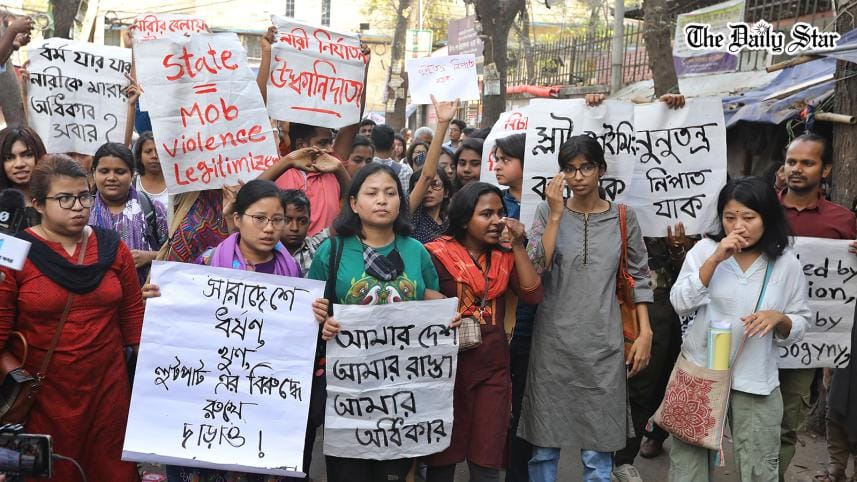Is smoking the problem, or that women are doing it?

A leisurely chat over a cup of tea and a quick smoke hardly has an ominous ring or suggest any associated danger—other than the consumption of tobacco and sugar, of course. Yet, that is exactly what turned out to be a nightmare for two people at a tea stall in Dhaka's Lalmatia area on Saturday. The only reason was that they were women.
An elderly man took offence and remarked that women should not be allowed to smoke there, at which the two women were duly offended. An altercation ensued with slurs quickly turning into slaps. In an appalling turn of events, the persecutor, a man well into his 60s, managed to incite a mob, calling the women "whores" for smoking in public. The mob pounced on the women. They were abused, harassed and assaulted. They were injured and parts of their clothes were ripped off. All because they smoked in public. Taken away into police custody, the two were then told not to file a complaint.
When asked about the matter later, Home Affairs Adviser Lt Gen (retd) Jahangir Alam Chowdhury duly noted that smoking in public is an offence—whether the laws against public smoking applied in this case could be a matter of debate—and that people should refrain from this habit. He also remarked that there had been a spat between the women and the old man, and that one of the women had apparently splashed tea on the man, thus triggering the whole incident.

However, the home adviser did not, for once, note the criminal nature of what the men had done to those women.
The Penal Code, 1860 in Bangladesh criminalises sexual assault against women, criminal force with intent to dishonour, and attempt of wrongful confinement of women (sections 354, 355 and 375), all of which apply to the mob and the elderly villain in question—all of them men, by the way, and perhaps many smokers among them too.
It is not about the consumption of tobacco (chewing zarda, for instance) but the act of smoking by women that is generally associated with Westernised rebelliousness, that almost automatically lends itself to "bad character." Women who smoke are frequently labelled as "wayward," implying they lack traditional values. Not for men, though. For them it might be seen as an added layer of appeal—a show of masculinity, even.
This double standard is deeply rooted in subcontinental gender norms, cultural expectations, and moral policing, which dictate that women should embody ideals of modesty, virtue, and domesticity.
In a justified show of outrage, people protested, many women among them. On Monday, protesters under the banner of "Bangladesh Against Rape and Oppression" staged a demonstration in front of Jatiya Sangsad Bhaban protesting what happened in Lalmatia, burning an effigy of the home adviser and demanding his resignation. They argued that while smoking in public may be subject to legal restrictions, it does not justify physical assault. They also criticised the adviser for failing to acknowledge the criminal actions perpetrated by the attackers against the two women in Lalmatia.
This is not at all about encouraging women—or men—to smoke. Smoking is harmful for both men and women. It increases the risk of lung cancer, other forms of cancer, chronic obstructive pulmonary disease (COPD), chronic bronchitis, and emphysema, cardiovascular diseases, hypertension, strokes, hormonal imbalances, and fertility issues for BOTH male and female smokers. No, it is about the male chauvinistic mindset that sets unreasonable standards for one gender and not the other. The same mindset spills into other spheres of public life—participation in sports, attire or even the nature of employment—with equal toxicity.
What happened in Lalmatia and our home adviser's response that followed had nothing to do with smoking. They only proved themselves as two more specimens confirming the stereotype which is easily threatened. It is quite simply discrimination. The same turn of events would have been quite beyond the question if it were two men.
It was never about smoking. It is just that women were doing it, and perhaps seen to be invading what is deemed to be men's territory. Feminist movements, urban youth cultures, and changing attitudes are slowly pushing back against these outdated norms, but incidents like the one in Lalmatia show that there is still a long way to go. But we will continue to raise our voice against injustice and gender-based violence.
With or without a cigarette between the fingers.
Naziba Basher is a journalist at The Daily Star.
Views expressed in this article are the author's own.
Follow The Daily Star Opinion on Facebook for the latest opinions, commentaries and analyses by experts and professionals. To contribute your article or letter to The Daily Star Opinion, see our guidelines for submission.




 For all latest news, follow The Daily Star's Google News channel.
For all latest news, follow The Daily Star's Google News channel. 
Comments